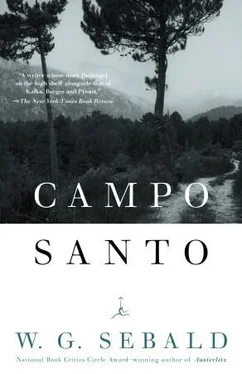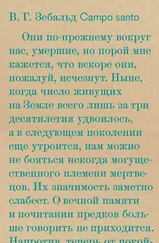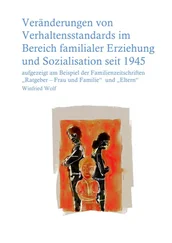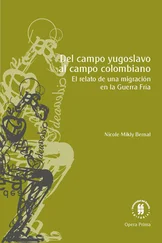That monstrous lady, in whom a dog lies buried, and whose draped garment covers the stench of the whole country, “with clammy fingers … holds the compass and cannot close the circle,” probably because — like the author himself — she is concerned, over and above the present task, with the problem of squaring morality implied by the question of whether by writing, and thus representing everyone else who does not write, he cannot make a contribution to the therapy of the nation, rather as Doubt cures his cold Lisbeth by the application of an “unidentified slug.” 27The black gall or bile that this curiosity of nature magically draws out of the depressive Lisbeth was, as Grass reminds us, still current in the sixteenth century as a synonym for the ink with which the writer draws his circles. However, a writer who uses black bile as a medium for creative work risks taking on the misunderstood depression of those for whom he writes.
The further course of Doubt’s story illustrates this very forcefully. After he has proved “that melancholia is curable”—by means of a suction slug — the author condemns him to twelve years in a mental hospital where he lives forgotten, “muttering over the jumbled handwriting on his papers” until, we do not know how, he himself is cured and finds a niche as a cultural affairs official in Kassel in West Germany. 28
If we ignore this too optimistic turn in the plot, the story tells us that in the social system of the division of labor it is the writer squaring morality who overcomes the collective conscience and, like Dürer in his self-portrait (cited in Grass’s text), points his right finger to the site of illness in his pen and ink drawing, adding the words: “Where the yellow spot is and where the finger is pointing, that is where it hurts.” 29
In choosing Dürer’s demonstration of suffering as the emblem of his own philosophy of mourning, Grass transcends the question of whether melancholy is a constitutional or a reactive condition, a question that ultimately cannot be clinically determined. It may be true that the chronicle of Grass’s journey through Germany would have been a far less intelligent book without that contrapuntal excursus into mourning, but it is equally true that there is something laboriously constructed about the excursus, making it rather like the performance of a historical duty.
III. Wolfgang hildesheimer: tynset
In contrast, Wolfgang Hildesheimer’s novel Tynset , which has had nothing like the attention and recognition that its inherent qualities should receive, seems to have been created from the heart of mourning itself.
The Anonymous Voice of Conscience
The story of the first-person narrator of this lengthy monologue, who is tormented by insomnia and melancholy and is never clearly perceived as a character, only as a voice, begins at a time (somewhere in the postwar years) when he was still trying to live in Germany, “where the superannuated and retired criminals, now too old for prosecution” appear to lead their lives unchallenged “among their children, their in-laws, and their grandchildren.” 30Uneasy and disturbed by what he, like Hamlet, recognizes as a state of unsanctified legitimacy, the nameless narrator, who likes to leaf through telephone directories at night, cannot resist the temptation to pursue the sense of complicity and fellow-traveling that lurks hidden everywhere in the country. First at random, then more systematically following the trails that emerge from his random samples, he conveys to a series of upright fellow citizens the information that all is discovered, causing those who receive so urgent a message to leave home in haste, perhaps with a violin case under the arm, and disappear over the horizon like Kleist’s corrupt village judge Adam after the identity of the person who broke the jug has been revealed.
In pursuing these activities the narrator, almost by chance, becomes an anonymous arbiter of conscience to his guilt-ridden contemporaries, a role that he adopts almost playfully, and not without relishing the grotesque comedy he has set in motion, until his hypersensitive ear, which picks up the slightest sound, one day hears the telltale crackle on his own telephone, and he knows that his own experimental system of persecution has turned against him.
Nights Like Hamlet’s
At this he acutely feels “the fear of the silence of the nights in which those beings that know no fear are at work,” and he decides to escape it by moving “to another country.” 31This other country, from which he now continues his narrative, can be identified as a remote region of the Alps but remains, for the reader, as anonymous and undiscovered as the figure of the narrator himself; in the further course of the story, indeed, it turns out to be that bourne from which, as Hamlet knows, no traveler returns, and is thus a metaphor of exile and death. The protagonist, now living there in deep distress, speaks to us from the fixed abode of melancholy which he roams by night, entangled in the inescapable associations of a terrifying past, which lies in wait for him on the stairs in the shape of Hamlet’s father. But having understood the dialectic of victim and persecutor by means of his own experiment, he rejects the ghost’s request for revenge, the better to preserve his awareness of his own innocence. He now uses the telephone with which he woke the guilty from sleep in Germany merely “to listen, sometimes to listen only to the humming silence, the one sound made by passing time.” 32
Moving on under the eye of Hamlet’s father, who is waiting to grasp his little finger and then his whole hand, the narrator remembers his own father, “killed by good Christian family men from Vienna or the Westerwald,” who does not stand on the stairs “looking for means of revenge.” 33However, his own renunciation of revenge in emulation of this absent example does not exorcise the poor souls who walk by night, and he listens as intently and with as much longing for the crowing of the cocks as the Danish watchmen at the beginning of Shakespeare’s play, for as everyone knows ghosts do not vanish until cockcrow.
But the narrator of Tynset is denied the pious Christian hope articulated in Hamlet —“It faded on the crowing of the cock. / Some say that ever ‘gainst that season comes / Wherein our Saviour’s birth is celebrated, / The bird of dawning singeth all night long”—bringing the prospect of final liberation from the nightmare of the past by salvation. 34Indeed, the Christian idea of hope seems to be finally discredited by the alcoholic misery of the housekeeper Celestina, who seeks absolution from the narrator in one of the many nocturnal scenes, by the figure of the Chicago evangelist Wesley B. Prosniczer, who also visits him unasked and later finds a cold grave in a snowdrift, and by a 1961 press cutting describing a defense minister about to kiss the ring on the hand that is offered to him by a cardinal. The crowing of the cock, then, does not here promise the dawning of a new day in any higher sense, merely a brief respite from the coming of the next of the many nights still to be endured, nights which — as Kafka noted — are divided into phases of waking and sleeplessness. 35
Rites of Melancholy
This realization of the impossibility of salvation matches the unrelated condition of melancholy which, in developing its own rituals, promises some relief but not release from suffering and the “feral deseases” so often mentioned in Robert Burton’s Anatomy of Melancholy . 36Among these rituals, in the narrator’s case, are the nocturnal reading of telephone directories and timetables, the unfolding of maps, and the making of plans for imaginary journeys to the most distant of lands, countries that might well lie beyond the sea shown in the background of Dürer’s Melencolia . Like Robert Burton, who was familiar with melancholy all his life, the narrator is a man “who delights in cosmography … but has never travelled except by map and card.” 37And the summer bed with room enough for seven sleepers where he meditates on stories such as that of the Black Death, with all its paths and coincidences, is of the same century as Burton’s compendium, an era of anxiety when the fear was first uttered “that the great mutations of the world are acted, or time may be too short for our designes.” 38The narrator’s digressive excursions from the starting point of this realization open up the view — again, a reminiscence from Hamlet —of a world lying far below melancholy, a “dead globe crawling with parasites” whose power of attraction is spent and forfeit. 39The icy sense of distance as the narrator turns away from all earthly life represents a vanishing point in the dialectic of melancholy.
Читать дальше












